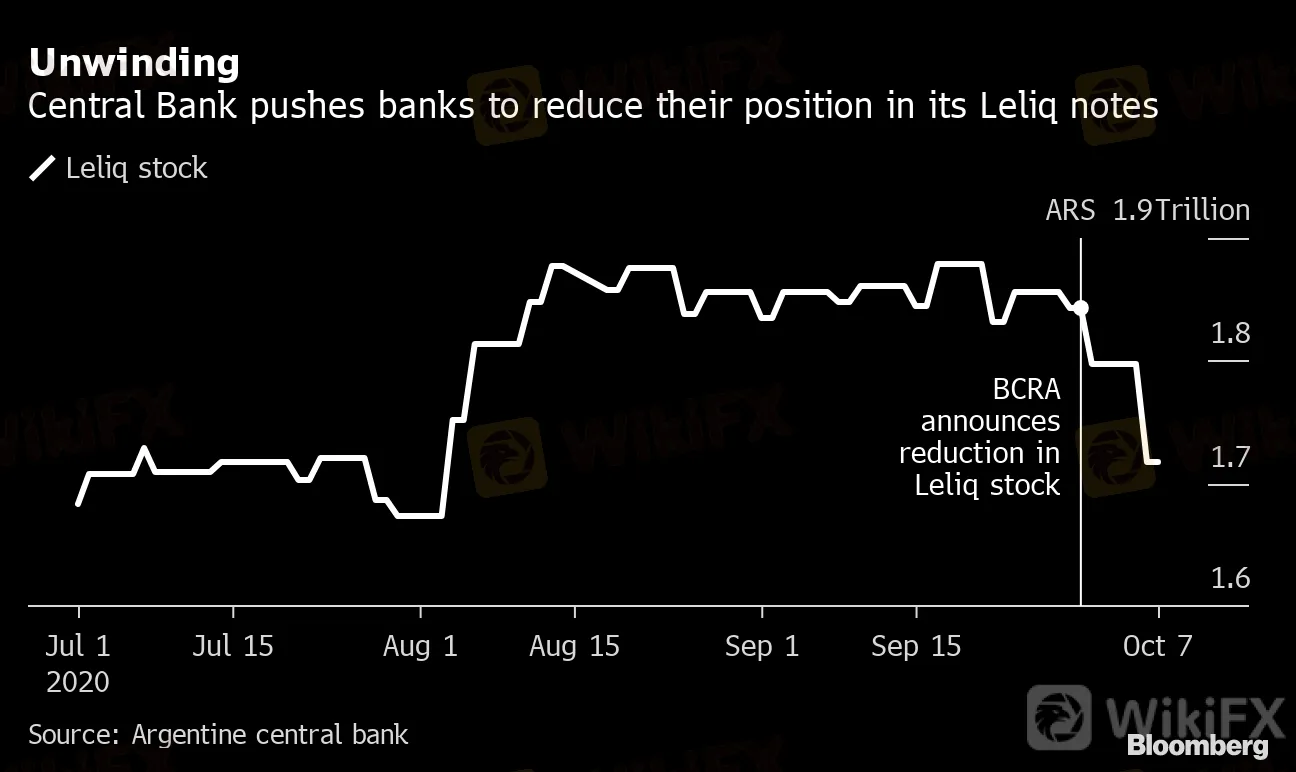简体中文
繁體中文
English
Pусский
日本語
ภาษาไทย
Tiếng Việt
Bahasa Indonesia
Español
हिन्दी
Filippiiniläinen
Français
Deutsch
Português
Türkçe
한국어
العربية
Argentina Nudges Banks Into Treasury Bonds by Changing Rates
Abstract:Argentinas central bank is taking steps to tighten its monetary policy and encourage banks to buy local peso assets.
Argentinas central bank is taking steps to tighten its monetary policy and encourage banks to buy local peso assets.
To do so, it raised a repo rate used by banks by 3 percentage points to 27%, and lowered its benchmark Leliq rate by 1 percentage point to 37%, according to a statement late Thursday. The rates had diverged at the start of the coronavirus pandemic as the government sought to mitigate the economic effects of the virus, the central bank said in its statement.
Unwinding
Central Bank pushes banks to reduce their position in its Leliq notes
Source: Argentine central bank

The move seeks to encourage banks to help finance the government deficit by buying local Treasury bonds, rather than by having the Central Bank print more money. With sky-high foreign borrowing costs and muted demand for local peso instruments, the country has been printing money to finance its virus stimulus plans.
“The idea behind this is to create incentives for banks to unwind their holdings in Leliq and instead, invest in Treasury bonds,” said Federico Furiase, director at consulting firm Eco Go. That will allow the government to access pesos locally rather than to have to resort to monetary issuance to finance its deficit in the very short term, he added.
Incentives to Change
{15}
The central bank has taken several measures over the course of the past few weeks to encourage banks to buy Treasury bonds. It reduced the amount of Leliq notes theyre allowed to hold while boosting the percentage of Treasury bonds they can have in their portfolios. Over the past week, banks reduced their Leliq holdings by 7%.
{15}
{17}
The move also marks the second increase for the repo rate in one week. On Oct. 1, the central bank announced that it was raising repo rates to 24% up from 19% and creating savings instruments with rates that exceed inflation, in an effort to encourage Argentines to save and invest in pesos.
{17}
The central bank added that it would be more flexible with companies looking to restructure their foreign debt. On Sept. 15, it said that it required companies with debt maturities larger than $1 million per month until March 31 to present a restructuring plan.
Read More: Pesce Says Argentine Firms See Restructuring as ‘Reasonable’
(Adds chart and detail on banks Leliq holdings in 5th paragraph.)
Disclaimer:
The views in this article only represent the author's personal views, and do not constitute investment advice on this platform. This platform does not guarantee the accuracy, completeness and timeliness of the information in the article, and will not be liable for any loss caused by the use of or reliance on the information in the article.
WikiFX Broker
Latest News
CySEC Warns Against Unauthorized Investment Firms in Cyprus
Why Even the Highly Educated Fall Victim to Investment Scams?
Warning Against Globalmarketsbull & Cryptclubmarket
Dukascopy Bank Expands Trading Account Base Currencies
UK Sets Stage for Stablecoin Regulation and Staking Exemption
Axi Bids AUD 52M to Acquire Low-Cost Broker SelfWealth, Outbidding Competitor Bell Financial
Crypto Influencer's Body Found Months After Kidnapping
STARTRADER Issues Alerts on Fake Sites and Unauthorized Apps
Italy’s CONSOB Blocks Seven Unregistered Financial Websites
Bitfinex Hacker Ilya Lichtenstein Sentenced to 5 Years in Prison
Currency Calculator


